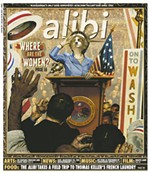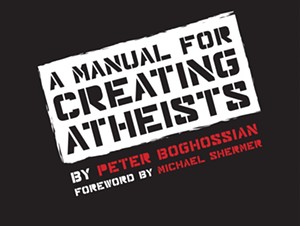For thousands of years, the faithful have honed proselytizing strategies and talked people into believing the truth of one holy book or another. Indeed, the faithful often view converting others as an obligation of their faith—and are trained from an early age to spread their unique brand of religion. As a counter to this tried-and-true tradition of religious evangelism, A Manual for Creating Atheists (Pitchstone Publishing, November 2013, $14.95) offers the first-ever guide not for talking people into faith—but for talking them out of it.
Drawing on the tools he has developed and used for more than twenty years as a philosopher and educator, Peter Boghossian teaches the reader how to engage the faithful in conversations that will help them value reason and rationality, cast doubt on their religious beliefs, mistrust their faith, abandon superstition and irrationality, and ultimately embrace reason. Says Boghossian, “There are entire organizations, a massive corpus of literature, about how to talk someone into a faith tradition. Catholics, Mormons, you name it. There’s nothing about how to talk someone out of a faith tradition and into reason and rationality. And that’s what the book is about. It’s about how to turn these engagements from pester into opportunity. The book gives people specific tools to talk people out of their faith and into reason.”
While acknowledging the important role authors such as Richard Dawkins, Sam Harris, and Christopher Hitchens have played in exposing the fraudulent nature and dangers of religion, Boghossian argues that the conversation must be moved forward to attack what rests at the foundation of all religions: unquestioned faith. “By undermining faith one is able to undermine almost all religions simultaneously, and it may be easier to help someone to abandon their faith than it is to separate them from their religion. My aim is to target faith, not religion.”
Just as many religions sent out their followers to convert the masses to their systems of belief, Boghossian sees the front lines as the countless one-one-one interactions that occur every day across the globe: “My goal is literally to create a generation of Street Epistemologists, people equipped with an array of dialectical and clinical tools, to go out into the streets, wherever the faithful are found and in every interaction to help them come to reason and shed superstition and faith. That’s my goal.
Literally to create a legion of people that will stop the tide of irrationality.” In the United States alone, he estimates “a standing ‘army’ of more than half a million potential Street Epistemologists ready to be empowered, given the tools, and informally deployed to deliver millions of micro-inoculations (of reason) to the populace on a daily basis.”
In developing his strategy for helping people rid themselves of illusion and discover a sense of curiosity and wonder about the universe and world, Boghossian pulls from diverse bodies of peer-reviewed literature, including that dealing with exiting cults, effective treatments for alcoholics and drug addicts, and other salient pedagogical interventions. Among his recommendations are the following:
• Understand how faith takes hold: “There are five reasons why otherwise reasonable people embrace absurd propositions: (1) they have a history of not formulating their beliefs on the basis of evidence; (2) they formulate their beliefs on what they thought was reliable evidence but wasn’t (e.g., the perception of the testament of the Holy Spirit); (3) they have never been exposed to competing epistemologies and beliefs; (4) they yield to social pressures; and (5) they devalue truth or are relativists.”
• Define what faith really means: “The term ‘faith,’ as the faithful use it in religious contexts, needs to be disambiguated from words such as ‘promise,’ ‘confidence,’ ‘trust,’ and, especially, ‘hope.’ ‘Promise,’ ‘confidence,’ ‘trust,’ and ‘hope’ are not knowledge claims. One can hope for anything or place one’s trust in anyone or anything. This is not the same as claiming to know something. To hope for something admits there’s a possibility that what you want may not be realized. . . . Hoping is not the same as knowing. If you hope something happened you’re not claiming it did happen. When the faithful say, “Jesus walked on water,” they are not saying they hope Jesus walked on water, but rather are claiming Jesus actually did walk on water.”
• Divorce faith from morality: “As a Street Epistemologist, one of your treatment goals is to change the perception from faith being a moral virtue (similarly, the idea that belief in a proposition makes one a good person) to faith being an unreliable process of reasoning—that is, from faith being something to which one should morally aspire, to faith being a failed epistemology. . . . I usually provide examples of well-known atheists most people would consider moral: Bill Gates (for donating his vast fortune to charity) and Specialist Pat Tillman (for abandoning an incredibly promising football career to give his life for his country). I then ask subjects if they can think of any examples of the faithful who are immoral.”
• Focus especially on the next generation: “We need a targeted, comprehensive campaign, in the K–12 school system across multiple scholastic disciplines, in summer camps, in libraries, in discussions with the faithful in front of their children, on TV and radio, in Internet chat rooms, and any and everywhere we can reach children. The thrust of our message must be that there are things we don’t know and it’s okay to not know— even in death. Not claiming to know something you don’t know isn’t a character flaw, it is a virtue.”
Despite the book’s provocative title, Boghossian stresses that creating atheists is not his ultimate goal, “What’s important is that we create people who lead thoughtful and examined lives. What’s important is that we create people that have reliable methods to discern make-believe land from reality.” He concludes, “The way I look at it is, what would the world look like on the basis of reason and evidence. They’d be willing to reconsider their beliefs. They’d formulate public policy on the basis of reason and evidence. I think the world would be more sane, less irrational, less subject to superstition. I think that our sciences would advance tremendously. I think it would move us in the direction of where we want to be as a society.”
About the Author
Dr. Peter Boghossian is a full-time faculty member in Portland State University's philosophy department. He was thrown out of the doctoral program in the University of New Mexico's philosophy department.
A Manual for Creating Atheists
A Pitchstone Book
www.pitchstonepublishing.com
November 2013
ISBN 978-098449321-0





